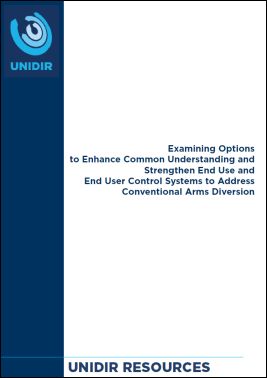This study responds to the various international calls to explore opportunities for greater harmonization of end use/r control systems, with particular regard to end use/r documentation, in order to strengthen efforts to prevent diversion of conventional arms.
The study has two related objectives: First, to identify which aspects of national end use/r control systems could feasibly be harmonized; and second, to explore the feasibility of, and potential frameworks for, a process to strengthen end use/r control systems and enhance cooperation to prevent diversion at the regional and/ or global levels. It uses a wide variety of materials, including multilateral instruments for strengthening and use/r control systems, research carried out by internationally recognized experts, as well as the results of a UNIDIR Survey on national end use/r control systems and international cooperation and information exchanges, distributed to States in June-October 2015. Several meetings and events convened by UNIDIR in 2015 were used to explore assumptions and proposals relating to aspects of the end use/r control system to be harmonized, and potential international processes to be utilized.
This study offers a number of options for States to have a meaningful dialogue on potential areas for cooperation, shared understanding and possible alignment of measures to enhance common understanding and strengthen end use/r control systems to address conventional arms diversion.
Citation: Conventional Arms and Ammunition Programme (2016). "Examining Options to Enhance Common Understanding and Strengthen End Use and End User Control Systems to Address Conventional Arms Diversion", UNIDIR, Geneva.
